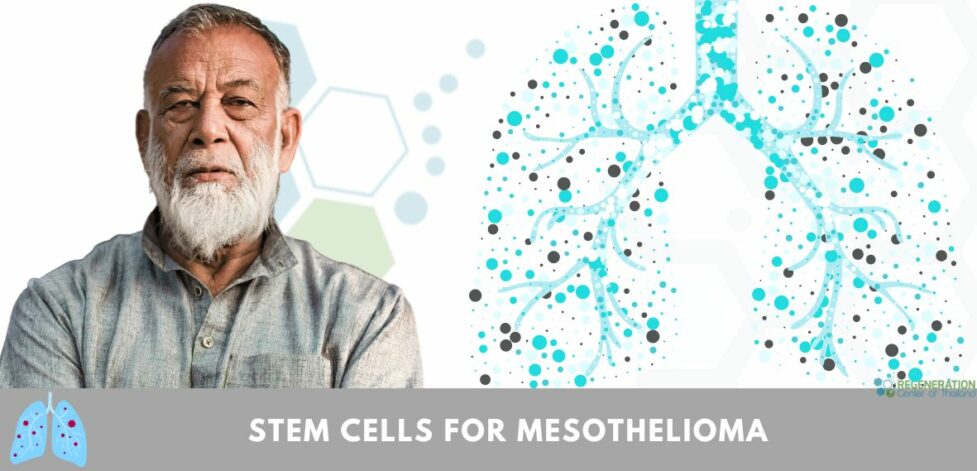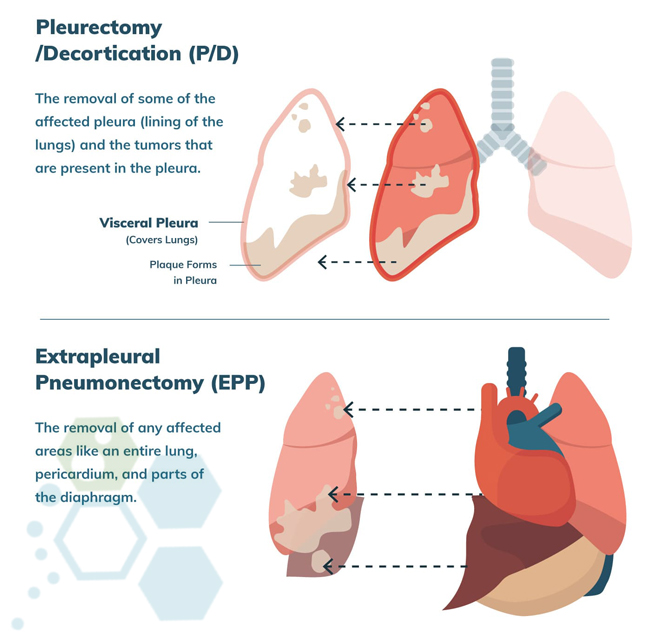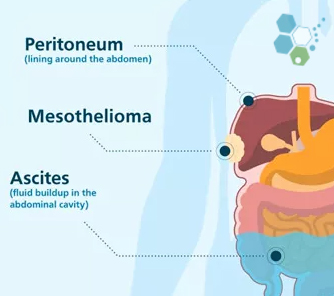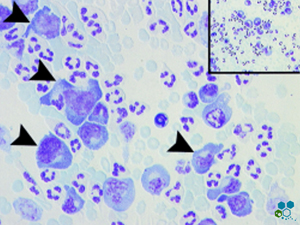Mesothelioma is a rare and aggressive cancer affecting mesothelial cells. It’s primarily caused by exposure to asbestos, used in construction materials and other products. Some common symptoms of Mesothelioma include shortness of breath, chest pain and pleural effusions. Diagnosing mesothelioma can be difficult due to the lack of traditional imaging techniques, such as X-rays or CT scans, used for more common forms of cancer [1].
Surviving Mesothelioma
In recent years, research has shown that stem cell therapies may effectively treat mesothelioma. Isolated and activated cells have been used to identify biomarkers associated with the disease and create personalized cancer treatments tailored specifically to each patient’s needs.
What Are the Risk Factors For Mesothelioma?
Several risk factors can affect the chances of getting pleural mesothelioma. Should be noted that having one or several of these risk factors, doesn’t automatically result in someone getting cancer. Asbestos exposure is the leading risk factor for mesothelioma and accounts for over 75 percent of all cases.
Other risk factors include:
- Radiation exposure, particularly to thorium dioxide
- A family history of mesothelioma
- Living with people who work with asbestos (asbestos particles can travel on hair, skin or clothing)
Types of Asbestos Cancers
Asbestos is a well-established cause of a multitude of health problems. Asbestos-related diseases and cancers include:
- Asbestosis

- Prostate cancer
- Colorectal cancer
- Pancreatic Cancer
- Breast cancer
- Kidney Cancer
- Gastrointestinal cancer
- Lung Cancer
- Ovarian cancer
- Liver Cancer
- Hodgkin lymphoma
- Multiple Myeloma
- Leukemia
- Mesothelioma
- Non-Hodgkin lymphoma
Causes of Mesothelioma Cancer
Occupational asbestos exposure is the leading common cause of mesothelioma. Patients in construction, factories, mechanics, mining, shipbuilding, defense, military or other manufacturing industries have the highest risk. Asbestos exposure can also happen by disturbing materials containing asbestos during construction or remodeling. Environmental asbestos exposure occurs when naturally occurring asbestos in soil or rocks is released into the air [2].
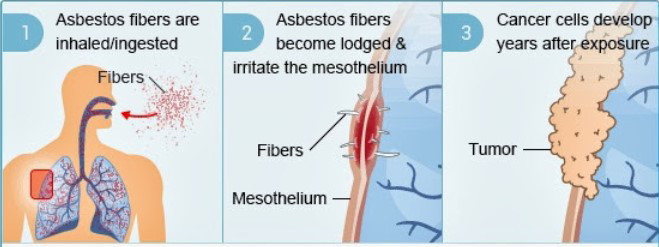
The development of mesothelioma can take between 10 to 50 years to develop. The peritoneal, pleural and mesothelium (pericardial lining) is a thin protective covering for organs. The Mesothelium layer is made from mesothelial cells & tissue that react negatively when exposed to asbestos. The asbestos fibers cause mesothelial tissue to inflame, resulting in the formation of scar tissue plaques on the surface of the lining. Malignant mesothelioma tumours begin to grow inside this scar tissue.
The 4 Types of Mesothelioma Cancer
- Pleural Mesothelioma happens when asbestos fibers get inhaled and embedded in the pleura protective lining of our lungs. After some time, the asbestos fibers cause significant inflammation leading to scarring within the lining of the tissue. This scarring can lead to the progression of mesothelioma disease. Asbestos fibers ingested through the mouth can also develop into peritoneal mesothelioma and lead to COPD and Pulmonary fibrosis. Peritoneal mesothelioma disease forms within the peritoneal lining of the abdominal tissue. Nearly 70% of mesothelioma cases are pleural mesothelioma.
- Peritoneal Mesothelioma accounts for roughly 15% of all cases and grows in the peritoneum, which lines the abdominal cavity. Surgery with heated chemotherapy is typically the most effective treatment for this variant [3].
- Pericardial Mesothelioma is a rare form of mesothelioma that develops in the pericardium membrane surrounding the heart. It is believed that pericardial mesothelioma cancer forms when asbestos fibers travel through our bloodstream before getting embedded into the pericardial membrane of the heart. Traditional treatment options are often limited because many treatments can also damage the heart. In such cases, a combination for heart disease or CHF when needed.
- Testicular Mesothelioma is also a sporadic and aggressive form of Mesothelioma cancer that can metastasize quickly. Less than 1% of cases develop testicular Mesothelioma, usually as a secondary tumour from peritoneal mesothelioma.
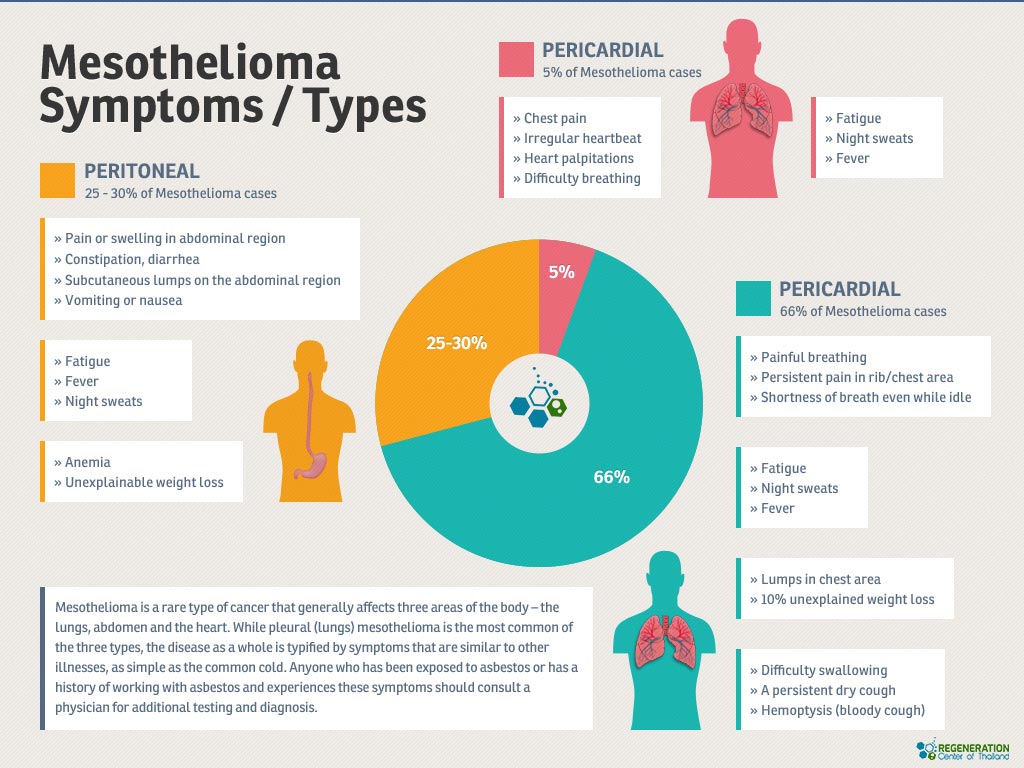
Symptoms of mesothelioma Asbestos Cancer
As mentioned previously, symptoms of Mesothelioma vary from patient to patient and usually develop gradually over very long periods. Some symptoms of Pleural Mesothelioma (lungs) include:
- Shortness of breath
- Persistent cough
- Chest pain
- High temperatures and cold sweats at night
- Unexplained weight loss
- Loss of appetite
- Clubbed (swollen) fingertips
- Chronic fatigue (extreme tiredness)
Symptoms of Mesothelioma in the mesothelium lining can include:
- Feeling sick constantly
- Stomach pain or swelling
- Rapid unexplained weight loss
- Frequent diarrhoea or constipation
- Loss of appetite
If you have one or more of these symptoms, please visit your primary care doctor and tell them about any exposure to asbestos you might have had.
How is mesothelioma diagnosed?
If your doctors suspect mesothelioma cancer, they will likely refer you to an oncologist for some diagnostic tests. There are several types of tests for mesothelioma that will be needed, including:
- Abdominal or Chest X-ray

- CT or MRI scan
- Fluid drainage samples and analysis – Check for fluid around the lungs or stomach
- Laparoscopy/Biopsy – a camera examines Thoracoscopy or Inside the chest or abdomen. A sample of tissue lining (biopsy) may be taken for additional tests.
These tests are generally the first line used to diagnose mesothelioma and to check for stage, severity or metastasis. The key to successful treatment and cancer recovery is an accurate early diagnosis with early intervention. Traditional radiology tests sometimes cannot detect mesothelioma tumour until it has already metastasized, making it difficult for most patients to diagnose at its early stages. New testing technology, including genetic screenings, has helped change this by providing a unique method of identifying biomarkers associated with mesothelioma at much earlier stages.
Samples from patients with mesothelioma can be analyzed to look for genetic mutations associated with the disease that would not be detected through traditional diagnostic methods. This allows oncologists to get an accurate picture of how far cancer has spread before treatment begins and make treatment decisions based on the current stage. Additionally, clinical trials for mesothelioma are exploring new ways to use stem cells to generate “organoids” (miniature organs) from patient cells to predicatively test how specific treatment combinations will affect individual patients’ outcomes before they are given the actual treatment.
How Is Mesothelioma Cancer Treated?
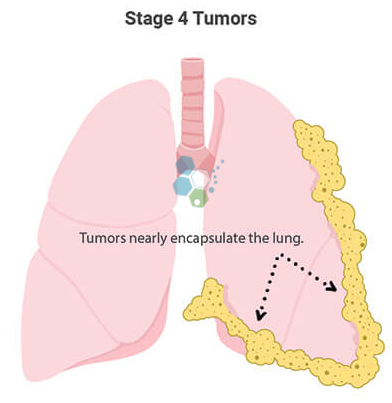 Depending on the stage and severity, mesothelioma can be treated using surgery, radiation therapy, cytokines, chemotherapy, Immunotherapy, CAR-T Cell therapy and several other conventional and biologic-based treatments. Traditional treatments for mesothelioma include:
Depending on the stage and severity, mesothelioma can be treated using surgery, radiation therapy, cytokines, chemotherapy, Immunotherapy, CAR-T Cell therapy and several other conventional and biologic-based treatments. Traditional treatments for mesothelioma include:
- Surgery: Patients in the early stages of cancer can benefit from mesothelioma surgery as it might offer the best chance at success and sustained remission. This surgical procedure has risks but is used to remove visible tumors from the chest or stomach areas.
- Chemotherapy may be recommended for some mesothelioma cases who are ineligible for surgery or in later stages. Chemotherapy can help improve survival rates but can cause many unpleasant side effects.
- Radiation therapy is also an option for late stages or in cases where surgery is no longer an option. Radiation therapies can help some symptoms and reduce the risk of developing local recurrence.
- Multimodal Therapies can be used to combine two or more mesothelioma therapies. In some cases, a combined approach controls cancer growth better than using only one treatment.
Emerging New Treatments for Mesothelioma
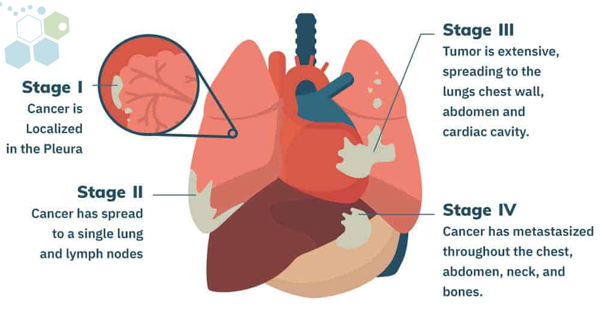
- Immunotherapy & Car-T Cells: Immunotherapy & CAR-T Cell Therapy uses a patient’s T cells (Autologous). The cells are isolated, expanded and activated in our laboratory over 2-4 weeks and then returned to the patient. The modified cells can help the immune system identify and kill cancer cells much more effectively and are often used in conjunction with antibodies to limit tumor growth potential.
- Gene Therapies and mRNA Vaccines are currently in the clinical trial phase and are used to modify the DNA of cells to help control cancer. One type of gene therapy for mesothelioma looks to repair the tp53 gene (tumor protein p53) & destroy cancer cells before they can multiply or spread.
- Cryotherapy is another alternative and non-invasive surgical procedure that freezes and kills cancer cells. The method can sometimes shrink the size of any active tumours before surgery [4]. It can also be used after surgeries to target recurrences safely & also to control symptoms as a palliative option.
- Virotherapy is another new type of cancer treatment that modifies viruses to seek and attack cancer cells.
- Photodynamic Therapy for Mesothelioma uses energy from lasers to activate a given drug and kill cancer cells from the inside.
Treatment of Mesothelioma with Stem Cells
Over the last two decades, stem cell therapy and functional healthcare techniques started being used as a treatment component for various types of cancers, including those affecting the lungs and abdomen (mesotheliomas). Mesenchymal stem cell therapy involves isolating, expanding and transplanting healthy stem cells into patients to replace damaged or diseased tissue. The goal of such treatments is restoring normal immune function or slowing down tumor growth. It is essential to understand that hematopoietic and mesenchymal stem cells provide different benefits and must be tailored to each patient’s current medical needs.
Hematopoietic (bone marrow) cells and mesenchymal stem cells (MSCs) are two types of (adult) stem cells that can work synergistically when combined with chemotherapy agents or immunotherapy medications like PD-1 inhibitors. Combining various kinds of cells can help improve outcomes by slowing down tumor growth more effectively than either would on its while also helping reduce side effects associated with chemotherapy or immunotherapy drugs used alone. Additionally, using adult stem cells (instead of embryonic cells) does not carry any ethical concerns surrounding research involving human embryos since they are much easier to collect without causing harm or trauma.
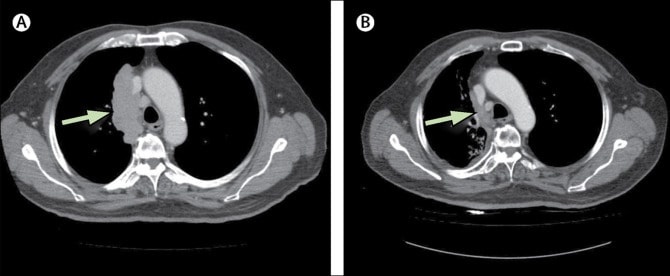
Stem Cells and Malignant Pleural Mesothelioma
As advancements continue within cancer stem cells, this technology will become increasingly important in diagnosing and treating various cancers, including those affecting the lungs and abdomen (mesotheliomas) [5]. By combining different treatments, researchers hope to develop more effective ways of fighting off cancer while minimizing side effects potentially caused by chemotherapy or immunotherapy drugs used alone. The Regeneration center already uses enhanced mesenchymal stem cells to treat autoimmune diseases. Several recent trials have shown that mesenchymal stem cell therapy can be used in treating thymoma cancer (thyroid gland) and lung cancer.
Using NK Cells to Kill Tumor Cells Left Behind
NK T cells can be harvested from various tissues in the patients body, including bone marrow, and offer a unique ability to home and migrate to desired locations when modified and activated. In some cases, the Regen Center provides a combination of NK cells and activated chimeric antigen receptors (CARS) to make the protocol even more targeted to the circulating cancer cells. NK cell therapy is somewhat similar to CAR T-cell therapy as both can enhance a patient’s immune system to fight cancer better using isolated cells from the patient.
Immunotherapy & Stem Cells for Malignant Mesothelioma
A tightly integrated approach in the treatment of mesothelioma, our non-toxic anti-cancer protocols continue to improve remission rates year after year. With discoveries through cancer research & clinical trials, new protocols are being developed to treat stage 1 – stage 4 mesothelioma. The Regeneration Center is a pioneer in regenerative healthcare and can apply the latest bioengineering techniques to manage malignant tumours better and help our patients live cancer-free lives with minimal toxicity and without fear of remission.
To determine eligibility and treatment opinions from our medical team, we will need to better understand the patient’s needs via recent histological results, Biopsy scans, blood tests, x-rays, scans and medical documents from your primary care oncologist.
Being diagnosed with the big “C” does not have to be the last stand. Even if traditional mesothelioma treatments have reached their limits, Our team can offer options that bring you one step closer to the latest alternative mesothelioma treatment and living a cancer-free life. Our mesothelioma treatment protocol can help you and your family get past the disease using safe and research-based treatment options. To learn more, please contact us today.
Published Clinical Citations
[1] ^Klampatsa A, Haas AR, Moon EK, Albelda SM. Chimeric Antigen Receptor (CAR) T Cell Therapy for Malignant Pleural Mesothelioma (MPM). Cancers (Basel). 2017 Sep 1;9(9):115. doi: 10.3390/cancers9090115. PMID: 28862644; PMCID: PMC5615330.
[2] ^Makarawate P, Chaosuwannakit N, Chindaprasirt J, Ungarreevittaya P, Chaiwiriyakul S, Wirasorn K, Kuptarnond C, Sawanyawisuth K. Malignant mesothelioma of the pericardium: a report of two different presentations. Case Rep Oncol Med. 2013;2013:356901. doi: 10.1155/2013/356901. Epub 2013 Aug 21. PMID: 24027648; PMCID: PMC3763578.
[3] ^Patarapadungkit N, Jangsiriwitayakorn P, Chaiwiriyakul S, Sirivech P, Thongbor R, Phanomsri EO, Nititarakul L. Modified Liquid-Based Cytology Technique for Immunocytochemistry in Effusion Specimen. Asian Pac J Cancer Prev. 2019 Sep 1;20(9):2611-2617. doi: 10.31557/APJCP.2019.20.9.2611. PMID: 31554354; PMCID: PMC6976855.
[4] ^Kindler HL, Ismaila N, Armato SG 3rd, Bueno R, Hesdorffer M, Jahan T, Jones CM, Miettinen M, Pass H, Rimner A, Rusch V, Sterman D, Thomas A, Hassan R. Treatment of Malignant Pleural Mesothelioma: American Society of Clinical Oncology Clinical Practice Guideline. J Clin Oncol. 2018 May 1;36(13):1343-1373. doi: 10.1200/JCO.2017.76.6394. Epub 2018 Jan 18. PMID: 29346042; PMCID: PMC8058628.
[5] ^Mutti L, Peikert T, Robinson BWS, Scherpereel A, Tsao AS, de Perrot M, Woodard GA, Jablons DM, Wiens J, Hirsch FR, Yang H, Carbone M, Thomas A, Hassan R. Scientific Advances and New Frontiers in Mesothelioma Therapeutics. J Thorac Oncol. 2018 Sep;13(9):1269-1283. doi: 10.1016/j.jtho.2018.06.011. PMID: 29966799; PMCID: PMC6643278.

